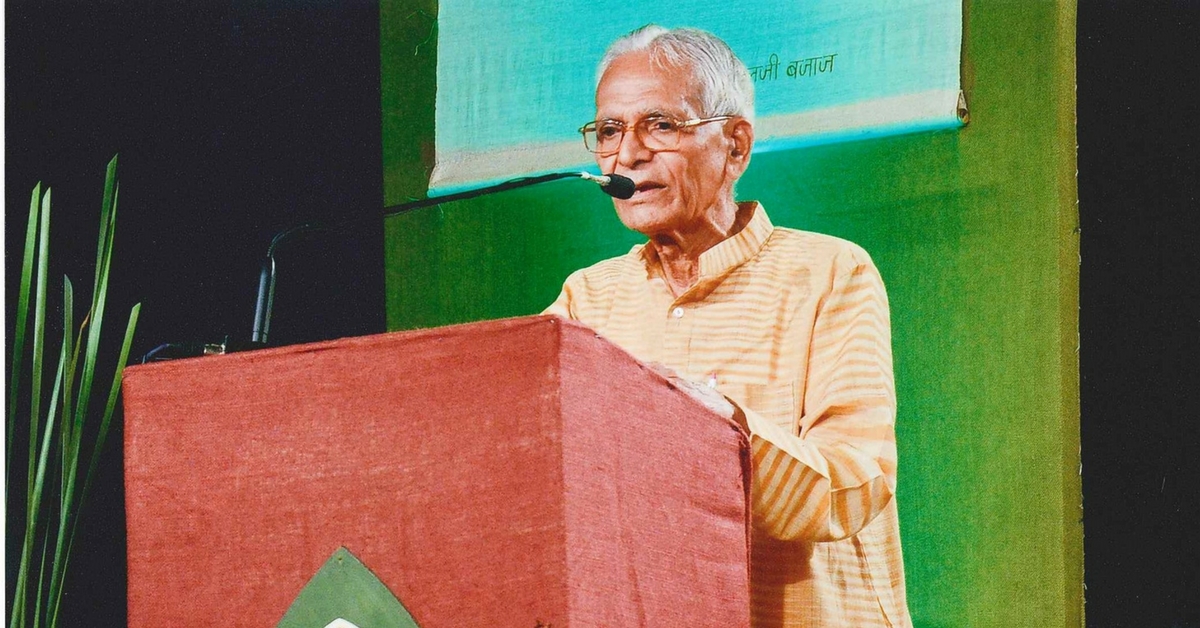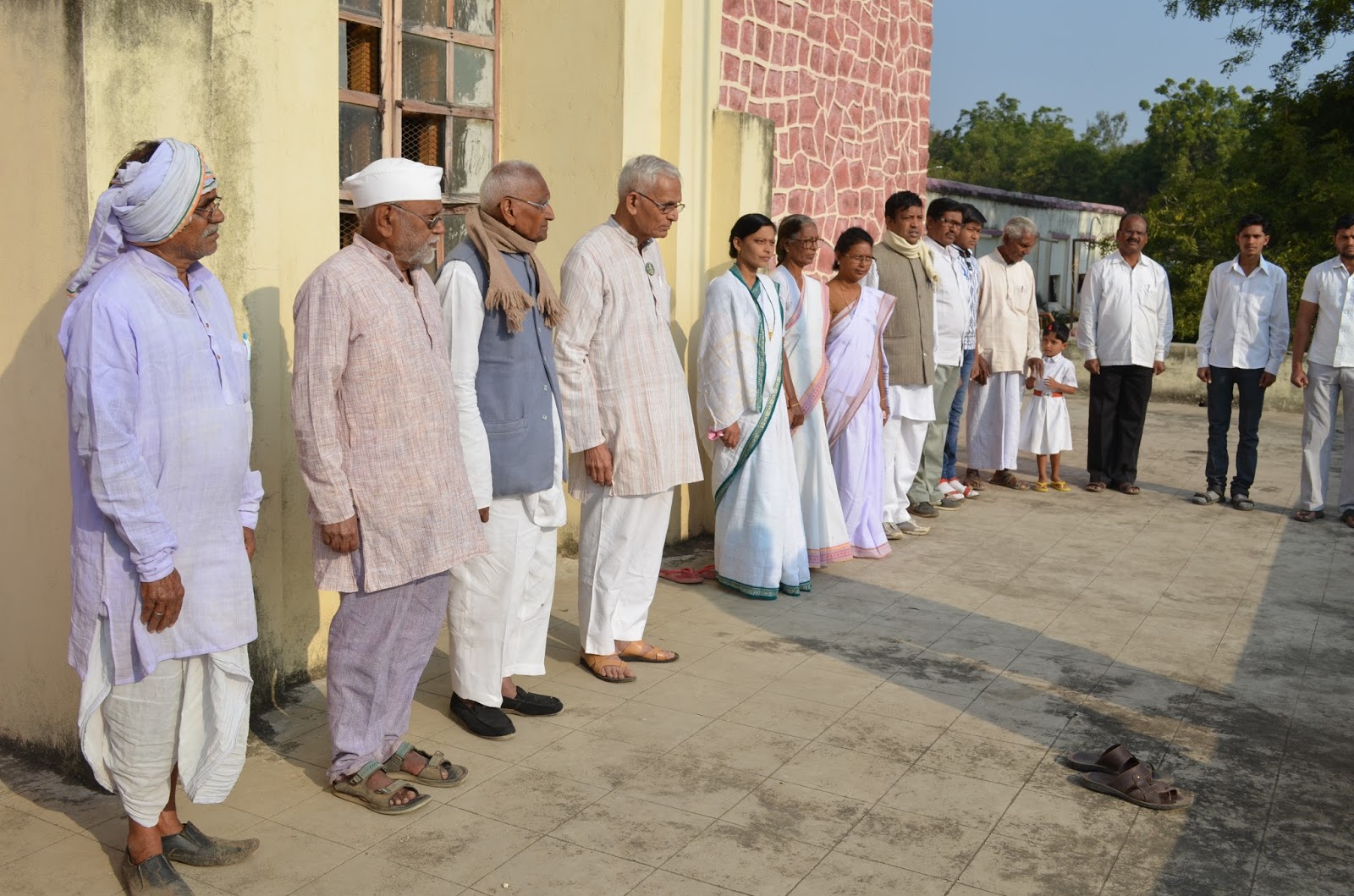Very few people are able to embody core Gandhian principles throughout their lives. However, Jaywant Mathkar has gone a step further beyond just embodying Gandhian values—he has used them to set up organisations and initiatives that have improved the lives of hundreds across rural India.
Born on November 6, 1940, “dedicated” and “selfless visionary” are synonyms to Jaywant Mathkar. Since his teenage years, Mathkar got associated with and followed the well-known Konkan Gandhian Appasaheb Patwardhan. For more than six decades since then, Mathkar has been involved in Sarvoday movements. He brought development in his native Sindhudurg as well as in Maharashtra through many Gandhian organisations. At the all-India level, Mathkar helps in policy designing and bridging various social barriers.
Through the efforts of Mathkar and his associates, migration of peasants and landless people to cities outside Sindhudurg has stopped. As the Vice President of Gopuri Ashram, Mathkar strives to bring about overall development of the village community. Under his leadership, the organisation invented and installed smokeless chulhas in 2010 in 274 homes, conducted cleanliness drives in villages, and installed biogas plants in homes. It supports several Gram Panchayats that have won State and Central Governments’ Model Village awards.
Gopuri Ashram has worked on sanitation initiatives since Patwardhan’s time. Mathkar has contributed significantly, with constant efforts to further strengthen the initiative. He has also helped set up several women’s self-help groups. In 2010-11, Mathkar promoted 35 SHGs involving 350 women who have been empowered.
He addressed the issue of lack of livelihoods by creating food processing opportunities in Sindhudurg. In the 90s, he encouraged farmers to plant more of the traditionally grown cashew trees. The Ashram developed various 100 % natural cashew products, including the traditional barfi, modak, sharbat, etc. To set up these processing units, the Ashram provided loans to the farmers.
Today, through this activity, some farmers have made a record turnover of over ₹2 crores.
Employing 70-75 women in these units, these processors, through a cooperative, provided cashew trees to women’s self-help groups. For that they have donated land too. The established farmers and the Ashram’s team travel around the country to train farmers on cashew processing.
In addition, the activities of Gopuri Ashram include farming, banana/cashew plantation, nursery and natural medicine production, and sales of festive food items and Goseva. Gopuri Ashram has played a vital role in the areas of cleanliness, energy, water conservation, agricultural industry, education, and textile industry. The organization plays a very important role at the outset, giving a good start, soon after which the same work becomes the people’s work. As a result, people, on their own, encourage others for the fulfillment of objectives of the organization, and thus help it grow with their mind, soul, and resources.
Mathkar strongly believes in providing education to girls, which led to setting up a primary and secondary school for school dropout girls in 1979 in Kudal village of Sindhudurg. It is worth noting that the building was made utilizing donations received from the community and teachers. It now has 250 children of landless labourers, workers, etc. Many of these children receive scholarships that are raised by donations by teachers and the community. Emphasis is also laid on non-formal education.
The mothers of the school children are involved in preparing the Midday meal.
Mathkar believes in people’s participation. This is conspicuous when you see involvement of each person at all levels associated with a particular activity. The team members and the beneficiaries are well-versed with the basic principles, values, and ethics of the Organization, i.e. Sarvoday.
The indefatigable Mathkar spends long hours traveling in public transport to reach and monitor several other Gandhian institutions and initiatives. Among the most successful of these is his khadi unit in Solapur. He set it up to make and sell khadi without the support and involvement of the government. It is among the few such large units today. From spinning, weaving, and dyeing to selling khadi, each activity is conducted independently, and several lakhs worth of khadi is sold every year.
An ardent Sarvodaya worker, Mathkar, in 1962, trained himself in Gramdan, Gram Swarajya, and Shanti Sena. Subsequently he joined Bhudan – Gramdan movement with Vinoba Bhave. Mathkar vigorously worked in this movement, getting several thousand acres of land donation, and distributed it to the landless through Gramdan Nav Nirman Samitee. In the process, he registered about 20 villages for Gramdan, the most well-known of which is Vinoba’s birth place Gagode in Raigad.
Mathkar also worked hard for the Bhangi Mukti campaign under the leadership and guidance of Appasaheb Patwardhan.
He founded the Mahatma Gandhi Lok Seva Sangh, and installed 500 Ambar Charkhas in Satara, Sangli, and Nasik districts.
Between 1982 to 1989, Mathkar served as the President of the Maharashtra Pradesh Sarvodaya Mandal. He is the Joint Secretary and Trustee of Shantivan Ashram near Mumbai, running an old-age home and serving the disabled and Leprosy patients.
At the all-India level, the Sarvodaya fraternity knows Mathkar well. He works as an organiser of the Khadi Samitee of Sarva Sewa Sangh. Here, he organised Charkha Yagya, inviting 55 spinners from all the states of India to raise their voice and advocate for their genuine demands. Mathkar also successfully organized the Kargha Yagya (Weavers Congress), which addressed and tabled the concerns and difficulties of weavers on the floor of the Government.
With a khadi bag slung over his shoulder, Mathkar keeps going, ever ready to serve the needy. Bubbling with new ideas, he defies age in every way. Mathkar acts locally and thinks globally.
He has a simple, down-to-earth personality, and is in every way doing his bit silently for the benefit and development of the rural people and community.
After receiving the Jamnalal Bajaj Award, Mathkar accepted chairmanship of the Sewagram Ashram Pratishthan, a trust founded by Mahatma Gandhi. Jamnalal Bajaj, whom Gandhi called “his fifth son”, was instrumental in establishing this Ashram.
Every year, approximately 10 to 12 lakh people from around the world (from about 150 countries) visit the Ashram to get inspiration from Gandhian thoughts. The Ashram has 122 acres of agricultural land, which is only partially under cultivation. But over the last three years, it has brought almost all the land under cultivation through natural farming. The Ashram produces all the types of vegetables it requires in the farm. The Ashram makes tooth powder, jams, squashes, turmeric powder (haldi), and other naturally processed products from agricultural produce. The Ashram has a cowshed (gaushala) with 34 cows of one of the best local breeds.
Recently, Mathkar created a centre for demonstrating the complete process of converting cotton to cloth in the Ashram. This prototype produces the cloth and demonstrates the process to visitors, and enlightens them about the potential of employment it generates, inspiring them to use hand-spun hand-woven cloth i.e. khadi. All these activities demonstrate to visitors some of the economic foundations of gram swaraj.
To explain the historical role of the Sewagram Ashram, and to demonstrate all the activities of Ashram, it has four female guides who inspire the visitors while taking them through this place.
The Ashram runs one khadi shop and a book stall to spread Gandhian thoughts. Combined sale of both these outlets is approx. ₹30 lakh annually.
The Ashram’s ‘yatri nivas’ hosts about 100 educational camps every year on subjects like Gandhi and Environment, Gandhi and sanitation, Hind swaraj, Women and youth empowerment, etc.
Dr. Ram Jadhav, the secretary of the Ashram, is very dynamic. He takes care of all the activities of the Ashram round the clock. The Ashram has a team of 40 inmates working dedicatedly in different areas and functions.
Radha Bhatt and ex-acting Chief Justice of Bombay High Court Chandrashekhar Dharmadhakari are the guides and philosophers for all the activities of the Ashram.
The Ashram does not take aid or grant from Indian or foreign governments, or any of their agencies. The Ashram generates its funds from donations from visitors and general people, in addition to various agricultural and dairy produce.
In the year 2012, Jaywant Mathkar received the Jamnalal Bajaj Award in the category of Constructive Work.
For more information about other past winners, visit the Jamnalal Bajaj Awards website.
Like this story? Or have something to share? Write to us: contact@thebetterindia.com, or connect with us on Facebook and Twitter.
NEW: Click here to get positive news on WhatsApp!
If you found our stories insightful, informative, or even just enjoyable, we invite you to consider making a voluntary payment to support the work we do at The Better India. Your contribution helps us continue producing quality content that educates, inspires, and drives positive change.
Choose one of the payment options below for your contribution-
By paying for the stories you value, you directly contribute to sustaining our efforts focused on making a difference in the world. Together, let's ensure that impactful stories continue to be told and shared, enriching lives and communities alike.
Thank you for your support. Here are some frequently asked questions you might find helpful to know why you are contributing?


